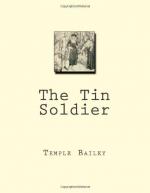WHITE VIOLETS
Bruce McKenzie’s letter arriving in due time at the Toy Shop, found Emily very busy. There were many women to be instructed how to do things with gauze and muslin and cotton, so she tucked the letter in her apron pocket. But all day her mind went to it, as a feast to be deferred until the time came to enjoy it.
In the afternoon Ulrich Stoelle arrived, bearing the inevitable tissue paper parcel.
“Do you know what day it is?” he asked.
“Thursday.”
“There are always Thursdays. But this is a special Thursday.”
“Is it?”
“And you ask me like that? It is a Thursday for valentines.”
“Of course. But how could you expect me to remember? Nobody ever sends me valentines.”
“My father has sent you one.” It was a heart-shaped basket of pink roses; “but mine I couldn’t bring. You must come and see it. Will you dine with us tonight?”
“Oh, I am so busy.”
“You are not too busy for that. Let your little Jean take charge.”
Jean, all in white with her white veil and red crosses was more than ever like a little nun. She was remote, too, like a nun, wrapped not in the contemplation of her religion, but of her love.
She still made toys, and the proceeds of the sale of Lovely Dreams had been contributed by herself and Emily for Red Cross purposes. There were rows and rows of the fantastic creatures behind glass doors on the shelves, and for Valentine’s Day Jean had carved and painted pale doves which carried in their beaks rosy hearts and golden arrows and whose wings were outspread—.
There were also on the shelves the white plush elephants which Franz Stoelle and his friends had made, and which were, too, being sold to swell the Red Cross fund.
Thus had the Toy Shop come into its own. “I have enough to live on,” Emily had said, “at least for a while, and I am taking no more chances for future living, than the men who give up everything to fight.”
So enlisted in this cause of mercy as men had enlisted in the cause of war, Miss Emily led where others followed, and the old patriarch of all the white elephants, who had been born in a country of blood and iron, looked down on women working to heal the wounds which his country had made.
“Let your little Jean look after things,” Ulrich repeated.
“Do you mind, my dear?”
“Mind what, Emily—?”
“If I go with Mr. Stoelle—to see his father about the—toys.”
“Darling—no;” Jean kissed her. “I don’t mind in the least, and the ride will do you good.”
“But you are not going to see my father about toys,” Ulrich told her, twinkling, as he followed her to the back of the shop.
“Do you think I was going to tell her that?”
She put on her coat and hat and off she went with Ulrich, leaving still unread in the pocket of the big apron the letter which Bruce McKenzie had written her.




